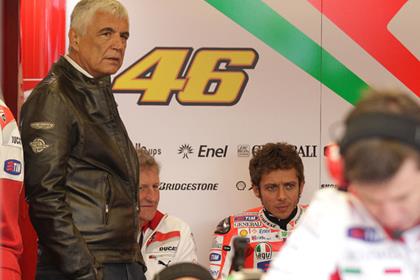2012 MOTOGP MOMENTS – DUCATI DISASTER
It’s the Valencia MotoGP test in November, 2010 and the wave of optimism sweeping through Ducati’s factory garage is so powerful it could almost knock you off your feet.
Valentino Rossi has arrived to prove the bike was no one-hit wonder in the hands of Casey Stoner and help restore Ducati as a potent threat to the Japanese domination of MotoGP.
Two frustrating and morale jarring years later and Ducati’s MotoGP project – constructed and assembled at eye-watering expense – is still miles away from challenging Honda and Yamaha for major honours.
Rossi has beaten a hasty path back to Yamaha and the impact of his failing to make the Desmosedici anywhere near a consistent podium has already been felt.
Ducati owners Audi have already begun a management cull in the wake of the Italian’s abysmal two-year spell on a Desmosedici, and the highest profile casualty was Filippo Preziosi.
Preziosi was an instrumental figure in Ducati’s MotoGP project since its inception back in 2003.
He was also influential in enticing Rossi to Ducati, yet two years later and Valencia 2012 was to be his last act as Ducati Corse’s General and Technical boss.
Preziosi will take up a new role as Director of Research and Development for Ducati Motor Holding.
It is not a demotion to match the humiliating one once experienced by a prominent Suzuki engineer, who went from a pivotal role with Barry Sheene to the outsourced production of luggage racks.
But former Ducati boss Livio Suppo believes Audi pulled the trigger too hastily.
Suppo worked closely with Preziosi between 2003 and 2009 and he told MCN: “I hope it is not a big mistake and by that I mean it is really difficult to replace Filippo. My personal view is that it is very strange this happened. The last two years have been very hard. The expectation of having Valentino on board was huge and the results were far from what they expected.
The easiest thing to do is change the boss if something doesn’t work but I think they should have considered the history of Filippo in Ducati. With all the respect for the people that are arriving, because I have nothing against them, but it seems a harsh decision.”
Suppo accepts that the Rossi disaster put Preziosi in a vulnerable position, but believes he should have been given 2013 to
He added: “I can understand from the point of view of the new owners that they want to come in and change something because when things are going wrong it is the boss with the more responsibility. I feel very sorry for Filippo and personally I think he deserved one more year to prove that he is still the man to do the job. Next year they have four very good riders. By waiting one more season with the line-up they have, you could have probably understood more if Filippo was missing something or not.”
The German influence of Audi is already being exerted. Taking the hot seat vacated by Preziosi is Bernhard Gobmeier, who most recently led BMW’s factory World Superbike project. He’s got an impressive CV in two and four-wheeled motorsport and is charged with being the man to make Ducati a competitive force again.
In a recent interview in Italy, Audi boss Wolfgang Durheimer laid out his masterplan for Ducatis revival.
The re-build will be a slow process but one management didn’t feel could be entrusted to Preziosi.
The target is to bridge the Grand Canyon-sized chasm that exists to Honda and Yamaha next season, winning races in 2014 and then launching a serious assault on the title in 2015.
Preziosi’s one big regret must be that he won’t be part of the revolution the German automotive is already instigating.
In his final media debrief with the press in Valencia, he bowed out with grace and dignity by saying: “I am very optimistic for the future because Ducati is changing a lot. Ducati is now part of a huge group (Audi) not only with a lot of economic resources but also with an incredibly high level of technology.
Ducati Corse will be structured in a more strong way with more people from the management side and technical side. There are more economic resources, more opportunity to speak to colleagues in the group on electronics, engines and materials in order to have synergies.
There will be more people involved in the management of Ducati Corse and if we pay attention to all the small details there is no reason not to be in the condition to win.”


